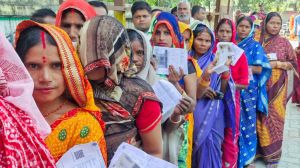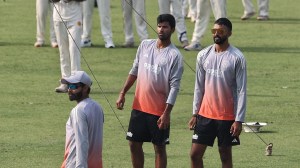It’s G8 versus P5 in nuke talks
GENEVA, June 10: The Group of Eight industrialised countries meeting in London on Thursday to discuss India, Pakistan and Kashmir face an aw...

GENEVA, June 10: The Group of Eight industrialised countries meeting in London on Thursday to discuss India, Pakistan and Kashmir face an awkward task, disarmament negotiators in Geneva say. On the one hand, the group comprising four of the five nuclear weapons states (United States, France, Russia and Britain which together with China are called the P5) is required to reflect the strong language of the P5 and the United Nations Security Council, censuring both countries for their nuclear tests and asking them to endorse international arms control pacts and begin bilateral dialogue on Kashmir.
Simultaneously, the enlarged group that includes non-nuclear weapons states Japan, Italy, Germany and Canada (G8) has to address an even more profound question of how the world can sustain the two-tiered system under which only the P5 are permitted to own nuclear weapons. Diplomats say Japan and Canada are expected to use strong language on nuclear disarmament with the latter willing to walk that extra milealone.
“The language on India, Pakistan and Kashmir may not hold any surprises. They (G8) will have to decide how to reflect the P5 and UN Security Council statement on that issue — but on nuclear disarmament which is a major concern for non-nuclear weapons states, it is not going to be that simple,” a western diplomat said. “Canada’s position will be the one to watch,” he added.
Canada, one of the strongest votaries of immediate negotiations on total nuclear disarmament is, according to envoys, in the midst of a domestic debate about its position vis-a-vis India and Pakistan but also nuclear disarmament. Canada has been as critical of India and Pakistan as it has been of the P5’s failure to talk about ridding the world of nuclear weapons. “Either their position on nuclear disarmament will harden which may not be acceptable to the nuclear powers or it will not, in which case they may be seen as backing down from their own position,” the diplomat said. In a separate development, eight nations joinedthis week to press the world’s nuclear powers to take immediate steps to dispose of their arsenals in a few years. “We are jointly resolved to achieve… a world free of nuclear weapons,” said a declaration by Ireland, New Zealand, Sweden, South Africa, Brazil, Egypt, Mexico and Slovenia. Norway and Canada are expected to join this call. “You can’t have nuclear disarmament only in one part of the world,” an envoy from this group said.
Last week P5 foreign ministers meeting in Geneva asked India and Pakistan to outlaw further tests and begin a dialogue on Kasmir which they identified as one “root cause” of problems between the neighbours, a language that was later backed by the Security Council in New York. Western diplomats this newspaper has spoken to say while Kashmir is back on the international agenda, there is widespread recognition that it is a bilateral issue to be resolved between New Delhi and Islamabad.



- 01
- 02
- 03
- 04
- 05




























